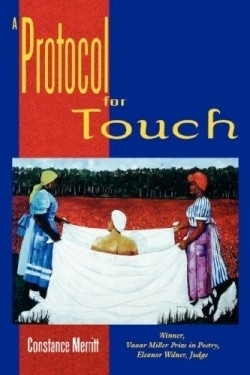A Protocol for Touch (Vassar Miller Prize in Poetry, 7)
“It’s a coarse and naked thing, the voice; / And
silence a swaddling blanket,” Merritt writes in a book whose major images have
to do with the senses and their denial. It is not only the voice that is
silenced (“hard to say whether hers is the silence of before speaking or
after”) but sight as well that is taken away, and touch elaborately reined. A
first book (and a prize winner), Protocol for Touch displays Merritt’s facility
with meter as perhaps her strongest tendency as the poems riffle through an
array of forms: sonnet, villanelle, pantoum, ghazal, sestina and blank verse
narrative. Even poems ostensibly in free verse find themselves falling into a
familiar iambic cadence, as if it were the poet’s natural breath.
Although poems hint at other definitions of self-“Woman of Color,” one of two
overtures to the volume; “Etude for Memory and Guitar,” a long and complex
piece apparently set in a school for the blind; many poems in which the speaker
is an awkward or unrequited lover-Merritt seems most eager to be recognized in
these poems as their poet. In some cases, as with the book’s concluding “Ars
Poetica,” the result is astonishing; elsewhere (as with the insertion of an
awkward reminder that the speaker is a poet in the otherwise fine “A Study in
Perspective”) the insistent identification mars the work. She acknowledges her
poetic influences outright: in one poem she even “christens” Emily Dickinson as
her mother. Elizabeth Bishop, another clear influence, is invoked both
specifically and, with a nod to the proem to Geography III, implicitly with
“Cradle Song: A Found Poem.”
Protocol for Touch is strongest, oddly, in its more freely structured poems;
it’s there that the voice of the poet-perhaps at its most coarse and naked, but
certainly at its most intimate-most connects with the audience.
Reviewed by
Janet Holmes
Disclosure: This article is not an endorsement, but a review. The publisher of this book provided free copies of the book to have their book reviewed by a professional reviewer. No fee was paid by the publisher for this review. Foreword Reviews only recommends books that we love. Foreword Magazine, Inc. is disclosing this in accordance with the Federal Trade Commission’s 16 CFR, Part 255.

